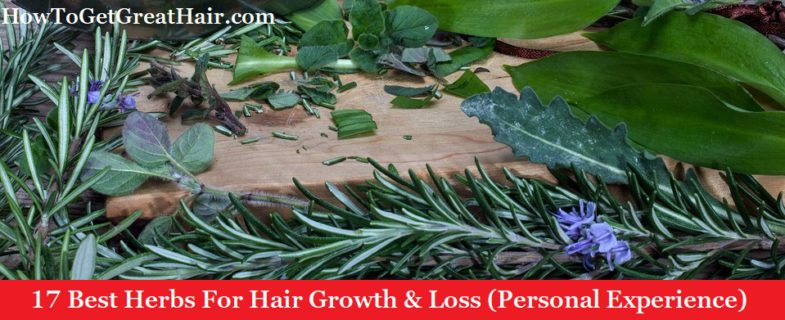
Are you struggling to grow your hair and nothing seems to help?
Well, you’re not using the right things. My #1 recommendation are natural remedies:
- have the strongest effect
- contain more nutrients than any product
- are really cheap and easy to find
So what exactly should you use? Well – here are the 17 best herbs for hair growth & loss (that I personally tried).
Note: These herbs are most effective in their extract form. For this reason, the supplements based on herbal extracts are the most effective.
#1 – Horsetail
Scientific Name: Equisetum Arvense
1. What It Contains
Horsetail is so effective because of 2 main compounds:
- silica mineral
- selenium
Also – it’s one of the herbs that contains most minerals and nutrients.
This includes flavonoids, potassium, saponins, bitters, etc.
2. The Benefits
In my opinion, Horsetail is the #1 herb for thinning hair.
However, it’s also in my top 3 herbs for hair – here’s what it can do:
- strengthens hair roots and strands
- stimulate follicles to grow faster (due to selenium)
- decreases hair loss
- softens dry hair
- decreases frizziness
3. How To Use It
Horsetail extract works much better than infusions or tea.
For this reason – I recommend supplements containing the extract form.
#2 – Stinging Nettle
Scientific Name: Urtica Dioica
1. What It Contains
Nettles are a real boost of vitamins and minerals.
In fact – they contain the largest mix of nutrients out of all herbs from this list:
- vitamins (A, B, C, K)
- iron
- Omega 3 fatty acids
- potassium
- silica
- other nutrients and minerals
2. The Benefits
Ironically, nettles are some of the best herbs when it comes to hair growth.
I say ironically because they don’t look like a hair vitamin bomb – do they?
- stimulate hair circulation and growth
- stops hair loss (by blocking DHT)
- reduces scalp inflammation
- strengthens hair roots
- thickens and adds extra volume
In fact – nettles are very effective for male hair loss (which is caused by DHT).
But that doesn’t mean women can’t use it – since it has so many benefits. [1]
3. How To Use It
Drinking nettle tea daily won’t help you too much.
You need either to apply it on your scalp or take it as supplements.
However – the first option takes a longer time to work.
So I personally recommend taking nettle extract as supplements.
#3 – Saw Palmetto
Scientific Name: Serenoa Repens
1. What It Contains
Saw Palmetto doesn’t have as many compounds as other herbs:
- fatty acids
- flavonoids
- plant sterols
- polysaccharides
However – these substances don’t exist in every herb. So that’s what makes it special.
2. The Benefits
Saw Palmetto works best for male hair loss/baldness caused by DHT:
- blocks DHT conversion [2]
- stimulates hair follicles
- increases hair density
Now – this herb works best for men who are no completely bald.
It really helps with prevention, but it’s not so effective in growing new hairs on a bald scalp.
Regarding women, it helps in hair loss caused by hormonal imbalances (too much testosterone). [3]
3. How To Use It
Once again, the best way is to take it as pills.
Saw Palmetto is quite hard to find as a herb – and it’s also really expensive.
So supplements remain a much better choice overall.
#4 – White Peony
Scientific Name: Paeonia Lactiflora
1. What It Contains
This herb doesn’t have lots of beneficial compounds for hair.
However – the most important one is paeoniflorin, as it increases the production of collagen.
Other than that, there are:
- flavonoids
- tanins
2. The Benefits
Though it has few studies behind, white peony is helpful for hair loss:
- promotes hair growth from the inside
- decreases hair loss caused by stress
- antioxidant proprieties
According to recent information, white peony works best in hair loss caused by hormonal problems (mostly in women).
3. How To Use It
It’s hard to find white peony in supplements – but there are some containing it.
Other than that, you can find it in conditioners or other hair products.
However – it works best when combined to other herbs (like Horsetail, Nettles).
#5 – Lavender
Scientific Name: Lavandula Officinalis
1. What It Contains
Lavender is effective mostly because of 2 classes of compounds:
- monoterpenoids
- sesquiterpenoids
Besides their top benefits, they are responsible for the amazing scent.
2. The Benefits
Lavender itself doesn’t have a major benefit for hair growth/loss.
It does have antimicrobial proprieties – but that doesn’t have much to do.
However – lavender oil is much better for hair:
- stimulates follicles (as any oil does)
- speeds up hair growth [4]
- fights scalp allergies
But compared to the top 3 herbs, its effect is quite general (so weaker).
3. How To Use It
Lavender oil works best for hair.
This herb can’t be used as supplements because it has no benefit on the inside.
It’s only helpful when applied topically (on the scalp).
#6 – Bamboo
Scientific Name: Bambusa Vulgaris
1. What It Contains
Just like Horsetail, Bamboo contains a high quantity of silica.
In fact – it’s the major source of silica among herbs (even higher than Horsetail).
Other than that, it contains several nutrients:
- minerals (cooper, zinc, magnesium, etc)
- dietary fibers
- antioxidants
2. The Benefits
Due to its high quantity of silica, Bamboo can strengthen hair strands considerably.
But that’s not all:
- fights shedding caused by fragile hair
- decreases hair breakage
- improves hair structure
- reduces frizziness
As you can see – it has some major benefits for fragile hair.
However, Bamboo isn’t such a popular remedy for hair. That’s why you should really add it to your diet.
3. How To Use It
There are some supplements containing Bamboo extract.
If you prefer to apply it on your scalp instead – it would be quite hard.
You can’t use regular bamboo to make an infusion. You actually need fresh one (which can be found in Asia).
#7 – Licorice
Scientific Name: Glycyrrhiza Glabra
1. What It Contains
The root of this herb is full of useful nutrients for hair:
- flavonoids
- saponins
- triterpens
- glycosides
Besides, there are additional minerals (but in lower doses).
2. The Benefits
Licorice isn’t a real hair loss remedy.
However – it’s extremely effective if you’re losing hair due to scalp problems/infections:
- anti-microbial proprieties
- cleanses the scalp very well
- nourishes and softens frizzy hair
Besides – it also helps if your hair is falling out because of damage.
3. How To Use It
This time – you can’t find this herb in supplements.
It has a very powerful effect, so it could be dangerous internally.
Instead – you can make an infusion from the root and use it as a rinse.
Or you can get a licorice-based shampoo for a deep cleansing. [5]
#8 – Ginkgo Biloba
Scientific Name: Ginkgo Biloba
1. What It Contains
This herb is good for almost any health problem.
So it’s quite obvious that it’s full of useful nutrients – including:
- antioxidants
- flavonoids
- terpenoids
- several vitamins and minerals
However – there isn’t a certain compound that makes Ginkgo Biloba so effective.
It’s their combination that seems to have so many benefits.
2. The Benefits
Surprisingly – this herb doesn’t grow hair faster itself.
It actually improves its general health in several ways:
- stimulates blood flow in the brain
- improves scalp circulation
- fights hair loss caused by stress
- works as a hair tonic [6]
So Ginkgo Biloba helps hair growth indirectly (by improving scalp nutrition).
3. How To Use It
There are 2 major ways:
- as pills
- as a rinse infusion
If you find Gingko Biloba leaves – you can make an infusion and rinse your hair with it. However, they are a bit hard to find.
However, I don’t recommend taking Ginkgo Biloba supplements just for their hair benefits.
They don’t have a major effect, so you can choose some stronger herbs (like the top 3).
#9 – Fo-Ti
Scientific Name: Fallopia Multiflora
1. What It Contains
This ancient Chinese herb contains some unique ingredients:
- lectins
- chrysophanic acid
- emodin
They are the reason why Fo-Ti’s effects are quite different from other herbs. [7]
2. The Benefits
Fo-Ti works best in 2 chapters:
- decreasing hair loss
- reversing grey hair
Additionally, it also increases hair growth by stimulating blood flow in the scalp.
Basically – it’s the only herb I know with these 3 major benefits.
So even though it’s not very famous in the West, it’s a must try among hair herbs.
3. How To Use It
The part used from this plant is the root – but it’s hard to find it (unless you’re from Asia).
So find a supplement containing the extract and you will get the same benefits.
Don’t worry – I personally know enough products containing Fo-Ti extract.
#10 – Henna
Scientific Name: Lawsonia Inermis
1. What It Contains
First of all – Henna is actually the powder from the plant’s leaves.
For this reason, there is little info about what it contains.
But if you choose an organic form – it should be quite natural (unlike most Henna products from the market).
2. The Benefits
Firstly, Henna powder is used as a natural hair dye. [8]
I personally use it quite often and I’m really satisfied with the results.
However – using Henna on your hair has some other benefits:
- speeds up hair growth
- strengthens hair strands and roots
- decreases hair loss
- keeps oily hair under control
3. How To Use It
Simply mix the powder with water, until you get a thick paste.
You can also add conditioner, eggs or yogurt for extra nourishing.
Then apply the mix on your hair and let it sit for about 30 minutes.
Make sure you was your hair several times, because the mixture is hard to rinse.
#11 – Spirulina
Scientific Name: Arthrospira Platensis
1. What It Contains
This herb contains some nutrients that aren’t found in every herb:
- niacin
- amino acids
- proteins
Additionally, it contains lots of vitamins and minerals (magnesium, B vitamins, iron, etc.).
2. The Benefits
Because of its high quantity of nutrients, Spirulina boosts hair health:
- strengthens strands and roots
- adds extra shine
- decreases shedding
- reduces hair breakage
Just like some of the previous herbs, it doesn’t help hair growth directly.
But it can improve hair health in general, which makes it grow even faster.
3. How To Use It
You can find spirulina as a powder for shakes.
Try to use it daily for your smoothies and you should also see an improvement in your hair.
#12 – Peppermint
Scientific Name: Mentha Piperita
1. What It Contains
In terms of compounds, Peppermint is similar to Lavender:
- mostly essential oils
- terpenoids
Basically – it doesn’t contain any ingredient that has a major benefit for hair.
2. The Benefits
Peppermint oil has several benefits.
And even though it doesn’t regrow new hairs (or make it grow faster) – it’s still useful:
- stimulates hair follicles
- fights scalp infections
- deep cleanser
Besides, it adds a great smell to your hair (in case you care about that).
3. How To Use It
Peppermint works best for hair as an oil:
- apply it on your scalp
- massage for 1-2 minutes
- repeat the procedure several times per week
The only downside is that it can make your hair greasier. So washing every 2-3 days is a must.
#13 – Green Tea
Scientific Name: Camellia Sinensis
1. What It Contains
Green Tea’s powerful effect is because of the high level of antioxidants it contains:
- polyphenols
- flavonoids
- catechins
It also contains a low dose of caffeine, but this isn’t relevant for hair.
2. The Benefits
The #1 benefit of Green Tea is that it promotes hair regeneration:
- stimulates hair follicles [9]
- blocks DHT
However, this herb alone can’t regrow new hairs.
Besides its benefits for hair loss, Green Tea is also effective against dandruff and oily scalp.
3. How To Use It
You can’t really find Green Tea as supplements – or at least not in a high dose.
Besides, it’s not the strongest herb for hair.
That’s why I would recommend taking it as pills only for its hair benefits. It’s not worth it.
Instead, using it as a rinse can help a lot more.
#14 – Barley Grass
Scientific Name: Hordeum Vulgare
1. What It Contains
This simple herb is actually full of various nutrients:
- vitamin A, B, C, E
- copper
- phosphorus
- iron
That’s the reason why it’s useful in many health problems (not just hair related).
2. The Benefits
The organic form of Barley Grass seems to reduce thinning hair.
But there’s more:
- decreases hair breakage
- strengthens fragile hair strands
- thickens hair roots
Sure enough – Barley Grass won’t make miracles for your hair all alone.
It’s not one of the strongest herbs (compared to Horsetail, Saw Palmetto).
But if you associate it with the right things, it will surely add up.
3. How To Use It
You can either use the powder – or try a supplement containing it.
I personally recommend the second option:
- the powder takes a long time to work
- not very effective alone (for hair)
#15 – Rosemary
Scientific Name: Rosmarinus Officinalis
1. What It Contains
This plant is a good source of several vitamins and minerals:
- thiamin
- calcium
- folate
- manganese
- vitamin B6, C
Additionally, it also contains dietary fibers – which can help overall health.
2. The Benefits
Rosemary isn’t my top recommended herb in terms of hair growth.
However – the oil has some real benefits:
- stimulates hair follicles
- speeds up hair growth
- prevents scalp infections or allergies
- increases blood flow and circulation
So just like Peppermint and Lavender (that are similar herbs) – Rosemary doesn’t grow hair itself. [10]
But it can be quite effective for hair that is in a bad shape.
3. How To Use It
Rosemary oil is available in most herbal shops.
Massage your scalp several times per week and wait to see the results.
#16 – Indian Gooseberry
Scientific Name: Phyllantus Emblica
1. What It Contains
Indian Gooseberry is rich in 2 types of substances:
- vitamin A and C
- other antioxidants
What does this have to do with hair? It increases the production of collagen.
2. The Benefits
Basically – this herb can strengthen existing hair and speed up its recovery (in case it’s damaged):
- thickens hair strands
- improves hair growth rate
However, it doesn’t seem to regrow new hairs.
So if you’re going bald and looking for a helpful remedy – this herb isn’t the best choice.
3. How To Use It
You can find Indian Gooseberry as a powder.
So using it is quite simple – just mix it with water and apply it on your hair.
#17 – Aloe Vera
Scientific Name: Aloe Vera
1. What It Contains
As you probably know – this herb is a real bomb of nutrients:
- 20 minerals
- 12 vitamins
- 18 amino acids
- 200 enzymes
Not to mention that it contains the most essential vitamins and minerals for hair. [11]
2. The Benefits
Despite its numerous benefits, Aloe Vera is one of the top herbs when it comes to hair growth:
- improves scalp health
- stimulates hair follicles and blood flow
- keeps hair hydrated and soft
In case you’re also dealing with dandruff, Aloe Vera is a great choice.
Besides – it helps scalp itching.
3. How To Use It
There are several ways to use Aloe Vera:
- natural based products
- organic gel
- fresh juice
Best Way To Use These Herbs
As I already said – I recommend using the herbal extracts (instead of the herbs themselves).
- But how exactly can you use the extract?
- And even more – how can you use several extracts together?
It’s simple: IN A SUPPLEMENT.
There’s a supplement I personally recommend – it’s called Folexin and it contains 8 of these herbs 17.
- Horsetail
- Nettle
- Saw Palmetto
- Bamboo
- Fo-Ti
- Peony
- Spirulina
- Barley Grass
So at this point – Folexin is the #1 hair supplement I know (for both men and women).
Besides, it’s way cheaper than 80% hair supplements I tried.
So in my opinion – it’s the easiest way to get these herbal extracts in a very comfortable manner.
1 – https://www.scirp.org/-journal/PaperID=22709
2 – https://www.ncbi.nlm.nih.gov/-pmc/articles/PMC2840915/
3 – https://www.ncbi.nlm.nih.gov/-pmc/articles/PMC4847595/
4 – https://www.ncbi.nlm.nih.gov/-pmc/articles/PMC4843973/
5 – https://www.ncbi.nlm.nih.gov/-pmc/articles/PMC6266641/
6 – https://www.ncbi.nlm.nih.gov/-pubmed/8254481
7 – https://www.ncbi.nlm.nih.gov/-pmc/articles/PMC4471648/
8 – https://scialert.net/-?doi=ijp.2012.483.489
9 – https://www.ncbi.nlm.nih.gov/-pmc/articles/PMC2569505/
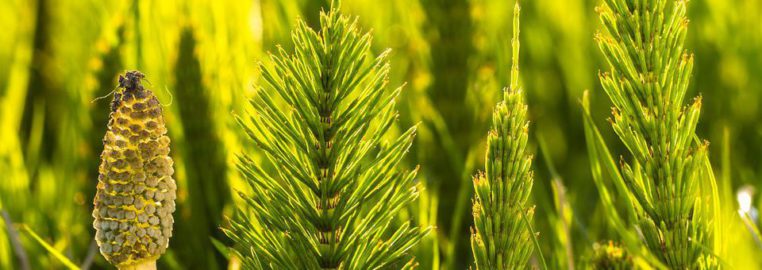
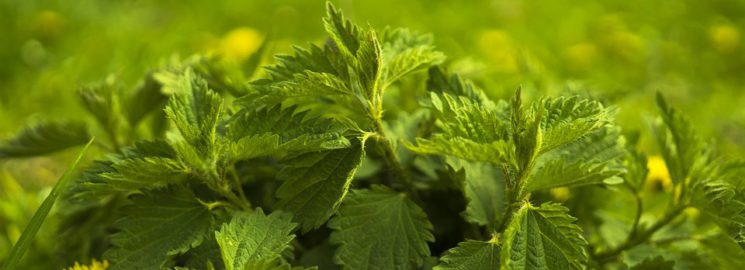

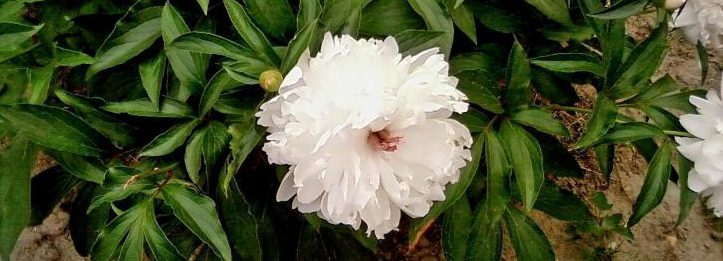
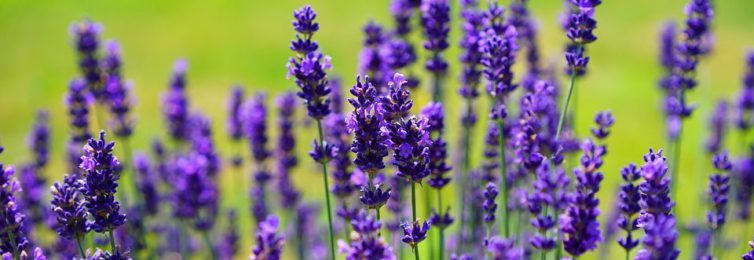

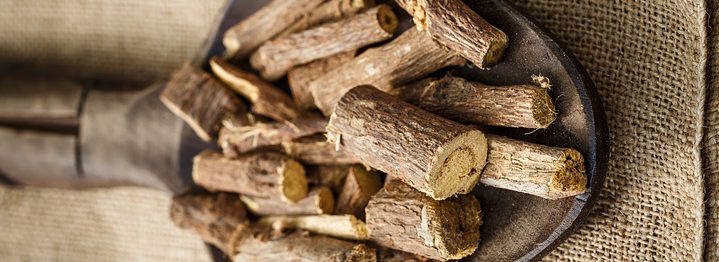
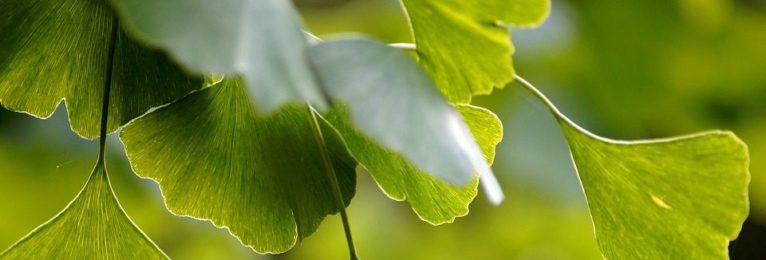









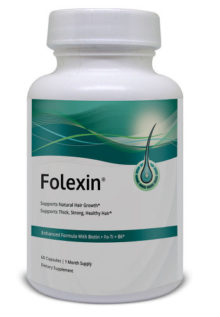

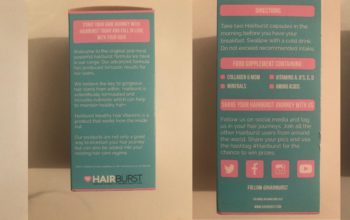
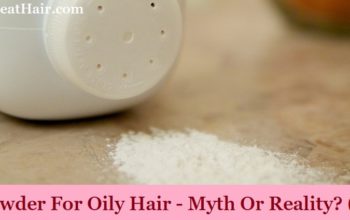
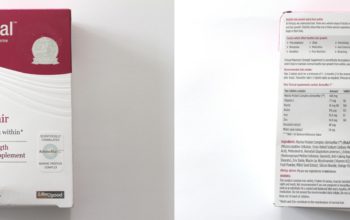
I use a mixture of lavender oil 10 drops, rosemary oil 10 drops, aloe vera, ginseng infusion and peppermint. I spray this on my scalp every night before going to bed and massage my scalp and I have seen a decrease in the amount of hair I am losing. You have to wash your hair more due to oily roots, but hair looks great. Definitely a fan of using herbs for hair loss rather than anything else.
Hi Rita, thanks a lot for sharing your tips. Most of the herbs you mentioned are included on my list, so they surely have a positive effect.
However, I think they work better if your hair loss is caused by minor factors (like stress, weather conditions, etc). In this case, topical products are good enough because the cause behind isn’t very severe. But if your hair loss was hormonal or caused by a scalp problem, I doubt this mixture would have such amazing results.
Anyway, in your case – there’s no point trying something stronger. This mixture seems to work perfectly. Thanks again for this idea.
Hello Olly,
Even though I’m not actively trying to regrow my hair, when it comes to correcting anything in my body, I believe 100% in reaching for something natural. I also try to buy organic ingredients/remedies – do you think this is also important?
One trick that I stumbled across not too long ago was how the facsia in our scalp can be an stimulated to help hair loss or growth. It stated that if you rub your scalp in a type of vigorous massage action, that will enable the hair follicles to re-enliven, to get the blood flowing again where it was lacking previously. Have you heard of this?
I’m always amazed at what herbs and botanicals can do for us! I wish big pharma had never taken such a strong hold on society, and we could treat all things purely with what nature gave us.
Thank you for spelling out all the benefits of these herbs for hair. I be will sure to pass this on if I find someone in need.
Take care,
Tom
Hi Tom, thanks for letting me know your opinion.
Regarding hair massage – all you read it’s true. Massaging your scalp and running your fingers through it daily (in a proper way) can increase hair growth significantly. I’ve tried it myself and it works. Some people say this method can also regrow new hairs in bald people, but I’m personally not sure this is true.
Anyway, it’s one of my top recommendations for someone who wants to grow hair faster. If you ever want to try it, you will sure see an improvement. Just keep in mind that you need to be consistent and do it for at least 1-2 months before you start seeing results. Hope this helps.